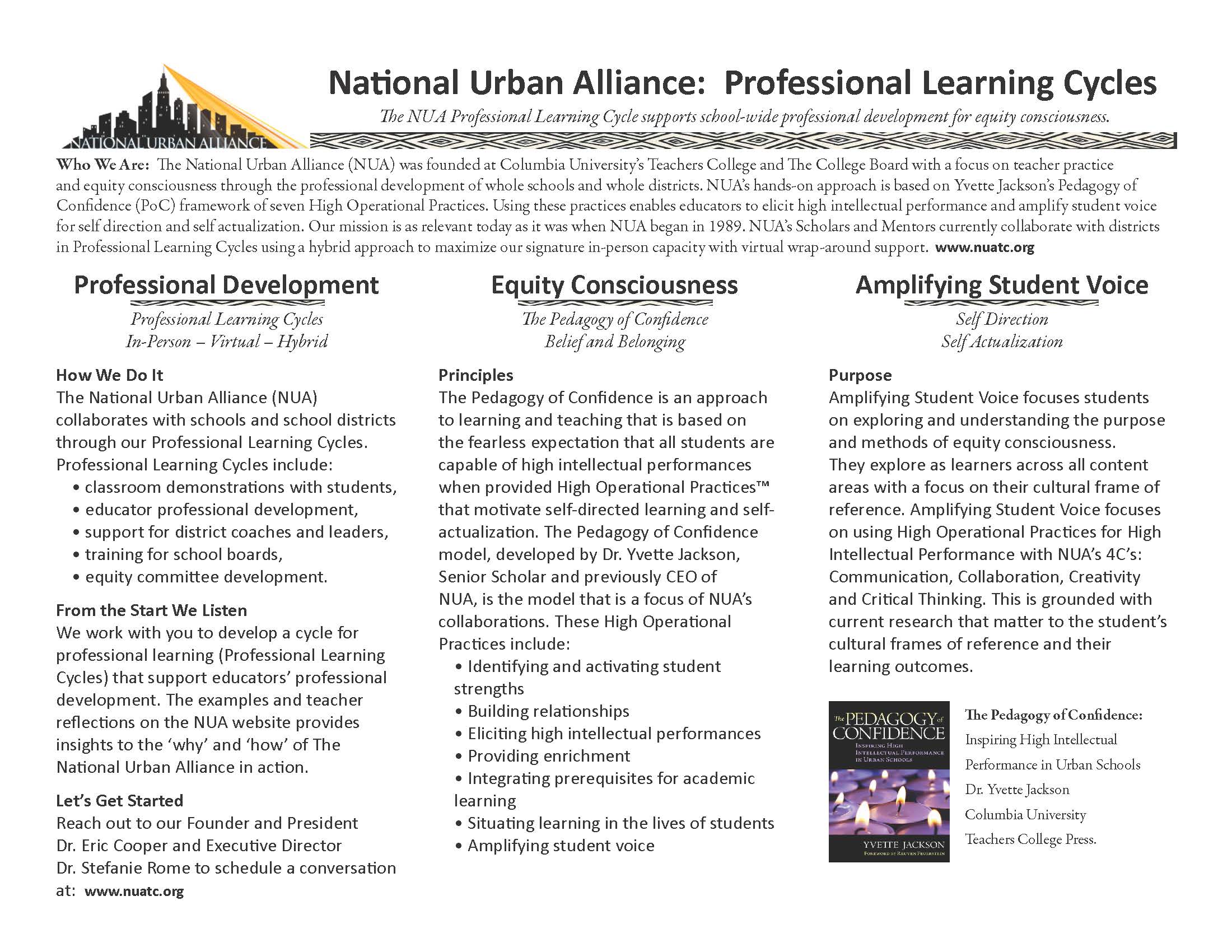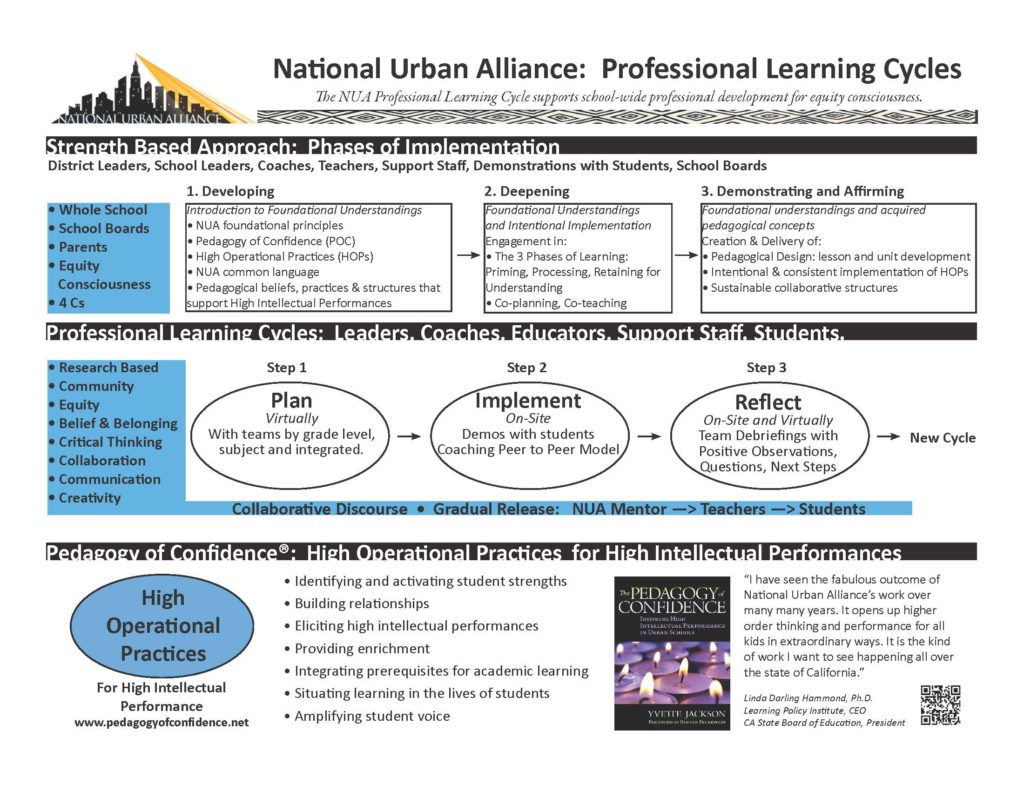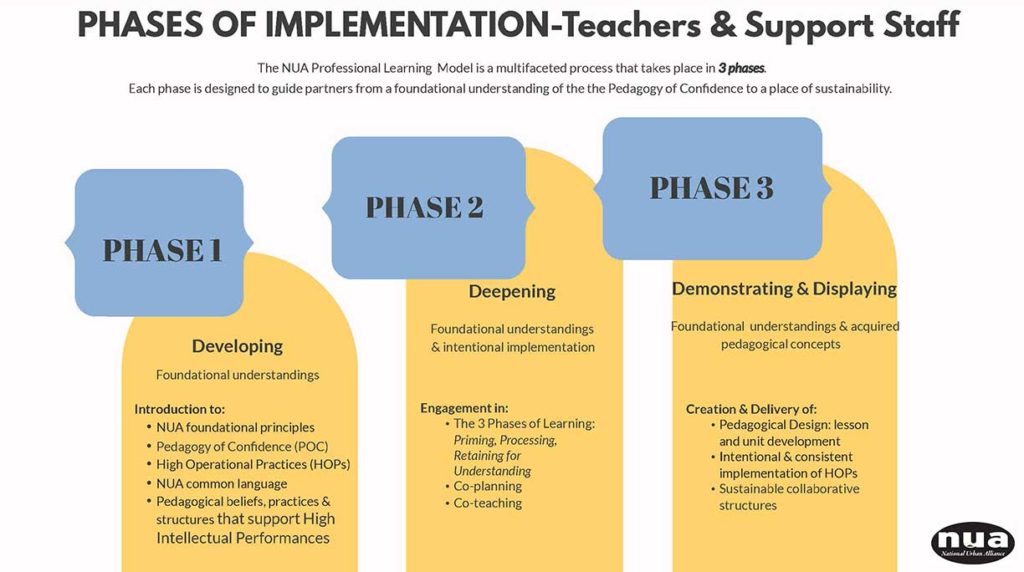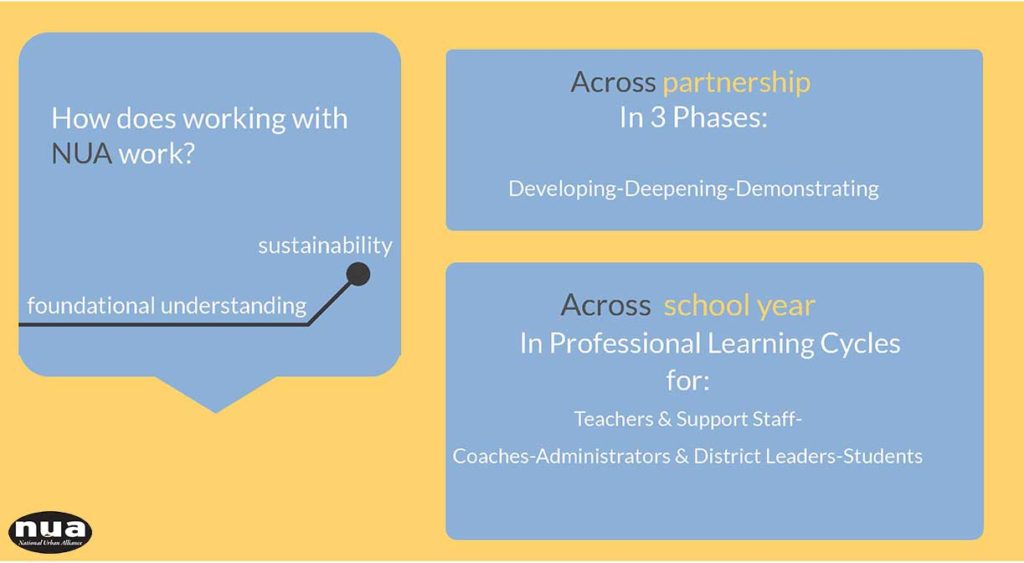Video and information on the above images: Student Voice; Redwood City—NUA Blog; Newark — NUA; Osseo — NUA
Who We Are
The National Urban Alliance (NUA) was founded at Columbia University’s Teachers College and The College Board with a focus on teacher practice and equity consciousness through the professional development of whole schools and whole districts. NUA’s hands-on approach is based on Yvette Jackson’s Pedagogy of Confidence (PoC) framework of seven High Operational Practices. Using these practices enables educators to elicit high intellectual performance and amplify student voice for self direction and self actualization. Our mission is as relevant today as it was when NUA began in 1989. NUA’s Scholars and Mentors currently collaborate with districts in Professional Learning Cycles using a hybrid approach to maximize our signature in-person capacity with virtual wrap-around support.
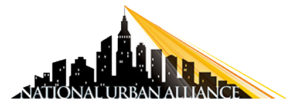 About The National Urban Alliance for Effective Education
About The National Urban Alliance for Effective Education
On this page:
- National Urban Alliance (NUA) Overview
- The Pedagogy of Confidence® and High Operational Practices
- Professional Learning Model and Pedagogy of Confidence Protocol ™
- Videos to tell the NUA Story in Action with Students and Educators
National Urban Alliance (NUA) Overview
The National Urban Alliance (NUA) was founded by The College Board and Columbia University’s Teachers College in response to persistent underperformance by students of color and those challenged by poverty. We worked closely with the Advanced Placement Program as well as Equity programs we initiated at the College Board. A targeted focus was placed on improving literacy, civic instruction, student leadership and critical thinking in content-areas. Additionally, we work with great success with boards of education and community leadership with the focus on educational improvement, parental support and community engagement.
 We believe that improving teacher effectiveness is the key to eliminating the achievement and opportunity gaps. The NUA approach, which builds on neuroscience and culturally validating learning and teaching, are described in detail in the award-winning book, “The Pedagogy of Confidence,” written by NUA’s Dr. Yvette Jackson. The Pedagogy of Confidence details the 7 High Operational Practices that are fundamental for the achievement and opportunity gaps to be eliminated.
We believe that improving teacher effectiveness is the key to eliminating the achievement and opportunity gaps. The NUA approach, which builds on neuroscience and culturally validating learning and teaching, are described in detail in the award-winning book, “The Pedagogy of Confidence,” written by NUA’s Dr. Yvette Jackson. The Pedagogy of Confidence details the 7 High Operational Practices that are fundamental for the achievement and opportunity gaps to be eliminated.
We are passionate in striving toward a world in which barriers to high levels of learning borne of racism, sexism and economic disadvantage are eliminated for all children.
We focus on three core beliefs:
- Intelligence is modifiable;
- All students benefit from a focus on high intellectual performance;
- Learning is influenced by the interaction of culture, language and cognition.
NUA has education experts who work with teachers, students, school administrators and communities to identify strengths to address the needs and break down barriers that inhibit achievement. We are values-directed and data-driven. We are hands on modeling with students and focus on whole school transformation through collaborative school communities. NUA partners with school districts across the country to accelerate and raise student achievement through professional development based on the Pedagogy of Confidence and designed to promote students’ high intellectual performances. Our efforts have resulted in tangible results for the educators and students we serve and we have contributed to the knowledge base of how to transform schools settings.
NUA partners with school districts to provide ongoing, embedded professional development using research-based instructional strategies that foster higher-level thinking. Each partnership is overseen by an NUA Project Director and district-designated Partnership Coordinator. Professional development services are provided by NUA Mentors on-site in each participating school where the mentor models and teaches best instructional practices, while guiding and coaching teachers with implementing best practices in their classrooms.
Eric Cooper, E.D.
Founder and President of National Urban Alliance
Linda Darling Hammond, Ph.D.
Learning Policy Institute • President and CEO
California State Board of Education • President
Yvette Jackson, Ed.D.
Author of The Pedagogy of Confidence
The Pedagogy of Confidence and High Operational Practices
www.pedagogyconfidence.net
“Change the input and the brain changes accordingly.”
—Reuven Feuerstein
 Our approach is guided by the The Pedagogy of Confidence, the fearless expectation and support for the high intellectual performance of all students, especially those who are dependent on the school and community for the skills and support needed to attain high achievement. We uncover strengths of students and teachers and then build on those strengths. The Pedagogy of Confidence High Operational Practices (HOPs) are about belief in students and providing the educators the tools, methods and understanding to create robust communities of belonging in which students thrive and flourish. This online guide and modules provide support to in person professional development.
Our approach is guided by the The Pedagogy of Confidence, the fearless expectation and support for the high intellectual performance of all students, especially those who are dependent on the school and community for the skills and support needed to attain high achievement. We uncover strengths of students and teachers and then build on those strengths. The Pedagogy of Confidence High Operational Practices (HOPs) are about belief in students and providing the educators the tools, methods and understanding to create robust communities of belonging in which students thrive and flourish. This online guide and modules provide support to in person professional development.
Pedagogy and equity cannot be isolated from each other. When we are truly committed to equity, we design pedagogy that achieves it’s original purpose: ‘to lead a child’ for self-actualization and self- transcendence: self-actualization that enables students to thrive in society and self-transcendence that motivates them to contribute to that society (Chen, 2014; Freire, 2012; Gladwell, 2008; Jackson, 2011). Equity consciousness is a way of educating that is informed by and situated in the belief that all students are innately wired for engagement, high intellectual performances, self-actualization and personal contribution.
 The seven High Operational Practices are codified within the Pedagogy of Confidence:
The seven High Operational Practices are codified within the Pedagogy of Confidence:
- Identifying and activating student strengths
- Building relationships
- Eliciting high intellectual performance
- Providing enrichment Integrating prerequisites for academic learning
- Situating learning in the lives of students
- Amplifying student voice
These seven High Operational Practices are the axis around which the Pedagogy of Confidence revolves, gearing the objectives for each practice to facilitate students’ exploration of the “frontier of their intelligence” (Whyte, 2002, CD 1) to produce the high intellectual performance that can motivate self-directed learning and self-actualization. As the teachers we work with say, “This is the new HIP HOP” (High Intellectual Performance through High Operational Practices). The high intellectual performance reflects the three beliefs gleaned from Feuerstein’s theory and methodology: (a) intelligence is modifiable, (b) all students benefit from a focus on high intellectual performance, and (c) learning is influenced by the interaction of culture, language, and cognition. My listing of the High Operational Practices does not denote a prioritized order. The practices carry equal weight. However, I do purposely begin the list with “Identifying and activating student strengths” because this practice has historically received the lowest focus among practices for reversing underachievement and increasing learning of school-dependent students.
- Read more about The Pedagogy of Confidence online at www.pedagogyconfidence.net.
- Read online the article Transformational Pedagogy on The Equity-Centered Capacity Building Network (ECCBN) website:
Transformational Pedagogy: Cashing The Promissory Note Of Equity For All Students – Especially Those Who Are Marginalized
By Yvette Jackson, Ed.D., CEO, National Urban Alliance for Effective Education
“Give light and people will find the way.”
—Ella Baker
This video of The Pedagogy of Confidence in action demonstrates the impact of NUA professional development on teacher practice and classroom culture. The video includes teachers, students and leaders with whole school implementation of NUA and High Operational Practices.
“Teachers also have to be willing.”
Amplifying Student Voice – High School
Newark Public Schools, New Jersey
Amplifying Student Voice in action with elementary and middle school students in a San Francisco Bay Area school district.
Redwood City School District, California
National Urban Alliance Professional Learning Model: An Overview
The National Urban Alliance (NUA) Professional Learning Model (PLM) is designed to transform underperforming schools into whole school success where all students demonstrate High Intellectual Performances (HIP) using High Operational Practices (HOP) with the Pedagogy of Confidence™.
The National Urban Alliance partnership is a practical, engaging, evidence-based program of professional learning, assessment tools, and capacity-building procedures for transformation and sustainability that enables schools to co-create curricula and instructional programs, collegially monitor their efforts, and continually rejuvenate their spirits to elicit high performances from students, teachers, and administrators.
Download the 2 page National Urban Alliance overview as a PDF file.
The National Urban Alliance partnership collaboration is defined by NUA’s steps of implementation. Go to the National Urban Alliance Professional Learning Model webpage for a 12 step overview of the NUA implementation model including the educators, school leaders, coaches, district leaders, full staff and students.
Pedagogy of Confidence Protocol™
The Pedagogy of Confidence® (PoC®) Protocol provides district and school partners with the tool to monitor progress from the beginning level of PoC implementation (Innovation), to developing PoC practices (Building) toward deeper and sustainable implementation (Sustainability). The PoC Protocol explicates the 7 High Operational Practices with indicators leading toward sustainable practices. The full document delineates the Essential Criteria and each of the three levels of PoC implementation for each of the 7 High Operational Practices.
Download the complete Pedagogy of Confidence Guidance Document (PDF)
Essential Criteria: Developing —> Deepening —> Demonstrating
Additional PDF Files
—Students Modeling with Students
NUA Mentor Demonstration in Classrooms
NUA Mentor in a second grade classroom following the Peer to Peer Coaching model with multiple teachers observing a lesson using a Bridge Map (analogies and relationships) to demonstrate collaborative processes with students for phonics and vocabulary.
National Urban Alliance Executive Director
Pedagogical Flow Map
Learning Policy Institute • President and CEO
California State Board of Education • President
January 2020
—During Inductive Categorization of Questions
Peer to Peer Coaching
Powerful Questions in a Fair Oaks Elementary School third grade classroom part of the National Urban Alliance (NUA) and Osseo Area Schools collaboration. The video is an example of a developing regular practice of peer to peer coaching with colleagues and the school academic coach, along with using video as part of the reflective practice. The use of Powerful Questions includes the modeling of the inquiry strategy, and inductively categorizing the questions in small groups.
Buffalo, NY Public School 61

